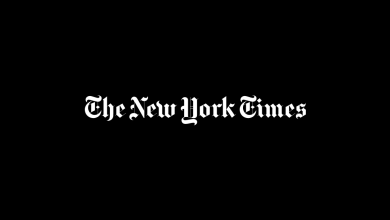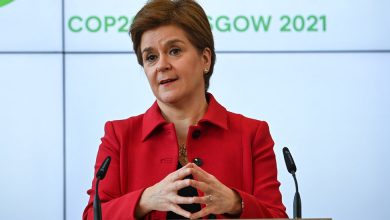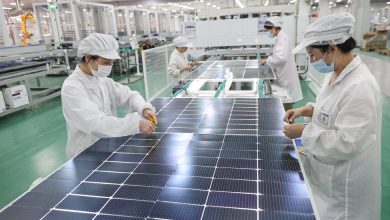Bernanke’s Economic Warning


What, me worry?Credit…Christopher Aluka Berry/Reuters
Bernanke is worried
Ben Bernanke says the U.S. economy, for the first time since the 1970s, could be heading toward a period of stagflation. Bernanke, the former Federal Reserve chair who headed the central bank during the 2008 financial crisis, warns that the nation is headed for a situation, much like the 1970s, where Americans were losing their jobs but still facing higher prices at the grocery store and at the pump. “Even under the benign scenario, we should have a slowing economy,” Bernanke told DealBook, in an exclusive interview with Andrew ahead of Bernanke’s new book. The book, “21st Century Monetary Policy: The Federal Reserve From the Great Inflation to Covid-19,” is publishing tomorrow. “So there should be a period in the next year or two where growth is low, unemployment is at least up a little bit and inflation is still high.”
Economists remain split on whether a soft landing is possible. Some economists say price pressures are easing. Others, including former top Obama economic advisers Larry Summers and Jason Furman, say a recession is likely.
But Bernanke is still hopeful a recession can be avoided. He said the Fed’s credibility with the public is going to be crucial to its ability to fight inflation, and it is something he is deeply worried about given how polarized the nation appears to be. In addition, he remains concerned that supply chain problems continue for all types of goods — even his own. “Given supply-chain disruptions, this book took six months to go from final manuscript to appearing in the store,” he said.
Even so, Bernanke says backing away from a 2 percent inflation target would be a mistake. He says current Fed chair Jay Powell should make it clear that the Fed’s inflation target remains unchanged. And do whatever it takes to bring inflation back to that level. “In everyday life, we judge the credibility of promises more by the reputations of the promise-makers than by the exact words they use,” Bernanke writes in the book. “The same principle applies to central bank promises.”
Bernanke says he is concerned about rising housing prices, but he doesn’t think a drop in prices would lead to the same problems the U.S. had when he was Fed chair. “That’s something that needs to be watched,” he said, but unlike in 2008, “the mortgages that are being lent to buy these houses are generally much higher quality than the subprime mortgages of 15 years ago.”
Bonus political controversy: Bernanke weighed in on the debate over forgiving student debt: “It would be very unfair to eliminate. Many of the people who have large amounts of student debt are professionals who are going to go on and make lots of money in their lifetime. So why would we be favoring them over somebody who didn’t go to college, for example?”
HERE’S WHAT’S HAPPENING
China’s economy takes a hit. The lockdowns in Shanghai and other Chinese cities have caused industrial output and consumer spending to slide to the lowest levels since the pandemic began, Bloomberg reports. The unemployment rate rose to 6.1 percent and the youth jobless rate hit a record amid spending cuts, factory shutdowns and supply chain delays.
JetBlue plans to launch a hostile takeover attempt for Spirit. JetBlue appealed directly to Spirit’s shareholders today by submitting a tender offer for their shares, after Spirit rejected JetBlue’s $3.6 billion offer.
C.E.O. pay packages rise to record levels. The median pay package for C.E.O.s of the biggest U.S. companies reached nearly $15 million last year, setting a record for the sixth consecutive year. Total compensation rose at least 12 percent for most executives, according to a Wall Street Journal analysis of data from MyLogIQ LLC.
Saudi Aramco’s first-quarter profits jump 80 percent from the same period last year. The company is cashing in on soaring oil prices, with its quarterly income reaching nearly $40 billion. Unlike Shell and Exxon, which face shareholder demands to reduce global warming, Saudi Aramco is almost entirely government-owned and faces little pressure to reduce output and carbon emissions.
West Virginia governor’s company is close to settling with Credit Suisse. Under the deal, Gov. Jim Justice’s coal mining company, Bluestone Resources, would reportedly ramp up production and make regular cash payments to Credit Suisse, The Financial Times reported. Bluestone had borrowed from Greensill Capital, the collapsed U.K. supply chain company that relied on Credit Suisse clients for financing.
McDonald’s leaves Russia for good
After more than three decades, McDonald’s, an icon of American lifestyle and capitalism, is selling its Russian business, and leaving the country, DealBook’s Lauren Hirsch reports. (It said in March it would temporarily close its operations there.) The move is a historic departure for a brand whose growth across the world became the symbol of globalism, and once served as the basis of Thomas Friedman’s peace theory.
McDonald’s says its Russian exit could cost as much as $1.4 billion. McDonald’s plans to sell its business to a local buyer. It will “de-arch” those restaurants, meaning they will no longer use the McDonald’s name, logo or branding. (It will retain its trademarks in Russia.) McDonald’s said it aims to continue to pay the employees until a deal is made, and then help them land new jobs with any potential buyer. “This was not an easy decision, nor will it be simple to execute given the size of our business and the current challenges of operating in Russia,” McDonald’s C.E.O. Chris Kempczinski wrote in a message to franchises, employees and suppliers.
Many brands and restaurant chains have paused their operations in Russia, but few have left entirely. A number of companies have voiced concern about the welfare of employees and common Russian citizens as the reason for not leaving the country completely. But it is widely believed that companies are not fully exiting Russia because they plan a return once the war is over. Critics have argued anything short of a full withdrawal is insufficient.
McDonald’s C.E.O. says what companies do will have “profound consequences.” In his message to franchisees, employees and suppliers, Kempczinski wrote that McDonald’s faced a “complicated” and “unprecedented” decision. “It is impossible to ignore the humanitarian crisis caused by the war in Ukraine,” he wrote. “And it is impossible to imagine the Golden Arches representing the same hope and promise that led us to enter the Russian market 32 years ago.”
The Russia-Ukraine War and the Global Economy
A far-reaching conflict. Russia’s invasion on Ukraine has had a ripple effect across the globe, adding to the stock market’s woes. The conflict has caused dizzying spikes in gas prices and product shortages, and is pushing Europe to reconsider its reliance on Russian energy sources.
Global growth slows. The fallout from the war has hobbled efforts by major economies to recover from the pandemic, injecting new uncertainty and undermining economic confidence around the world. In the United States, gross domestic product, adjusted for inflation, fell 0.4 percent in the first quarter of 2022.
Energy prices rise. Oil and gas prices, already up as a result of the pandemic, have continued to increase since the beginning of the conflict. The sharpening of the confrontation has also forced countries in Europe and elsewhere to rethink their reliance on Russian energy and seek alternative sources.
Russia’s economy faces slowdown. Though pro-Ukraine countries continue to adopt sanctions against the Kremlin in response to its aggression, the Russian economy has avoided a crippling collapse for now thanks to capital controls and interest rate increases. But Russia’s central bank chief warned that the country is likely to face a steep economic downturn as its inventory of imported goods and parts runs low.
Trade barriers go up. The invasion of Ukraine has also unleashed a wave of protectionism as governments, desperate to secure goods for their citizens amid shortages and rising prices, erect new barriers to stop exports. But the restrictions are making the products more expensive and even harder to come by.
Food supplies come under pressure. The war has driven up the cost of food in East Africa, a region that depends greatly on exports of wheat, soybeans and barley from Russia and Ukraine and is already dealing with a severe drought. Amid dwindling supplies, supermarkets around the world have begun asking customers to limit their purchases of sunflower oil, of which Ukraine is a top exporter.
Prices of essential metals soar. The price of palladium, used in automotive exhaust systems and mobile phones, has been soaring amid fears that Russia, the world’s largest exporter of the metal, could be cut off from global markets. The price of nickel, another key Russian export, has also been rising.
Social media executives should evaluate their policies to ensure that “everything is being done that they can to make sure that this information is not spread.”
— Gov. Kathy Hochul of New York criticizing social media platforms for their role in influencing the Buffalo shooter’s racist beliefs and allowing video of his attack to circulate.
Bezos beefs with Biden
The Amazon founder, Jeff Bezos, is trolling President Biden on Twitter. After Biden on Friday connected lowering inflation with corporations paying “their fair share,” Bezos quipped, “The newly created Disinformation Board should review this tweet, or maybe they need to form a new Non Sequitur Board instead.” He said that conflating lower inflation with higher corporate taxes amounted to “misdirection.”
Still bristling, Bezos fired again yesterday. He lauded Joe Manchin, the centrist West Virginia senator who must be cajoled by fellow Democrats for any legislation to pass and has halted many stimulus plans. “Manchin saved them from themselves,” Bezos wrote, plunging the company into politics at a fraught time internally, amid an employee unionization push, and just as most executives are trying to stay out of difficult debates and any accompanying trouble.
Wrangling with the government over taxes on Twitter means calling public attention to a touchy topic for Amazon. The company reported about $20 billion in income in 2020 yet said it owed only about $1.8 billion in federal taxes. That’s a 9 percent tax rate — less than half the rates both corporations and workers must pay. When Biden unveiled plans to raise rates and close tax loopholes last year, he singled out Amazon, saying, “I don’t want to punish them, but that’s just wrong.” Amazon did not respond to DealBook’s request for comment.
Companies are facing a backlash for wading into politics. Disney last month lost its special tax status in Florida after opposing a law limiting gender identity discussions in schools. Now, Republican lawmakers at the state and federal levels are drafting similarly retributive legislation for politically minded businesses. But for executives, it’s a balance. Many workers, shareholders and customers are demanding that corporations speak up, and pressure could increase now that abortion rights have become a major midterm election issue. So Amazon’s current C.E.O., Andy Jassy, is probably not looking for this fight right now.
Bezos quietly butters up the government, just like Elon Musk. While both have been publicly critical of the Biden administration, Bezos’ Blue Origin and Musk’s SpaceX spend significant resources lobbying officials to pick up their space exploration tabs and to win NASA contracts. Senator Bernie Sanders, Democrat of Vermont, has accused them both of using NASA like an A.T.M. and tweeted at Bezos on Saturday about Amazon’s labor issues and soaring profits.
THE SPEED READ
Deals
-
The Adani Group, led by Asia’s richest person, Gautam Adani, is buying the Swiss cement giant Holcim’s Indian businesses in a $10.5 billion deal. (FT)
-
The state-controlled, Emirates Telecommunications Group, acquired a 9.8 percent stake in Vodafone for $4.4 billion. (FT)
-
Carlyle Group is in advanced talks to buy ManTech International, a U.S. government contractor. (Bloomberg)
Russia-Ukraine war
-
Renault is selling its majority stake in the Russian carmaker Avtovaz. The deal includes a six year buyback option. (NYT)
-
NATO plans to fast-track the process to admit Finland and Sweden. (NYT)
-
Italy, the host of this year’s Eurovision Song Contest, thwarted attacks from pro-Russian hackers during the competition. Ukraine’s entrant won the contest. (Insider, NYT)
Policy
-
“Followers Are a Valuable Currency. Who Should Own Them?” (WaPo)
-
Inside the life of the FTX crypto exchange founder Sam Bankman-Fried. (NYT)
-
How Hollywood and the media contributed to the political rise of the “Hillbilly Elegy” author J.D. Vance. (NYT)
-
Lloyd Blankfein says the U.S. is at a “very, very high risk” of recession. (CBS)
Best of the rest
-
Goldman Sachs is dropping a fixed vacation time for its senior bankers, telling them they can take off as much time as needed to “rest and recharge.”
-
Private plane usage soared last year. Will it stay that way? (BBC)
-
“The Tesla Effect: Snowmobiles, Boats and Mowers Go Electric” (NYT)
-
“Are You Happy? Your Boss Is Asking.” (NYT)
We’d like your feedback! Please email thoughts and suggestions to [email protected].




